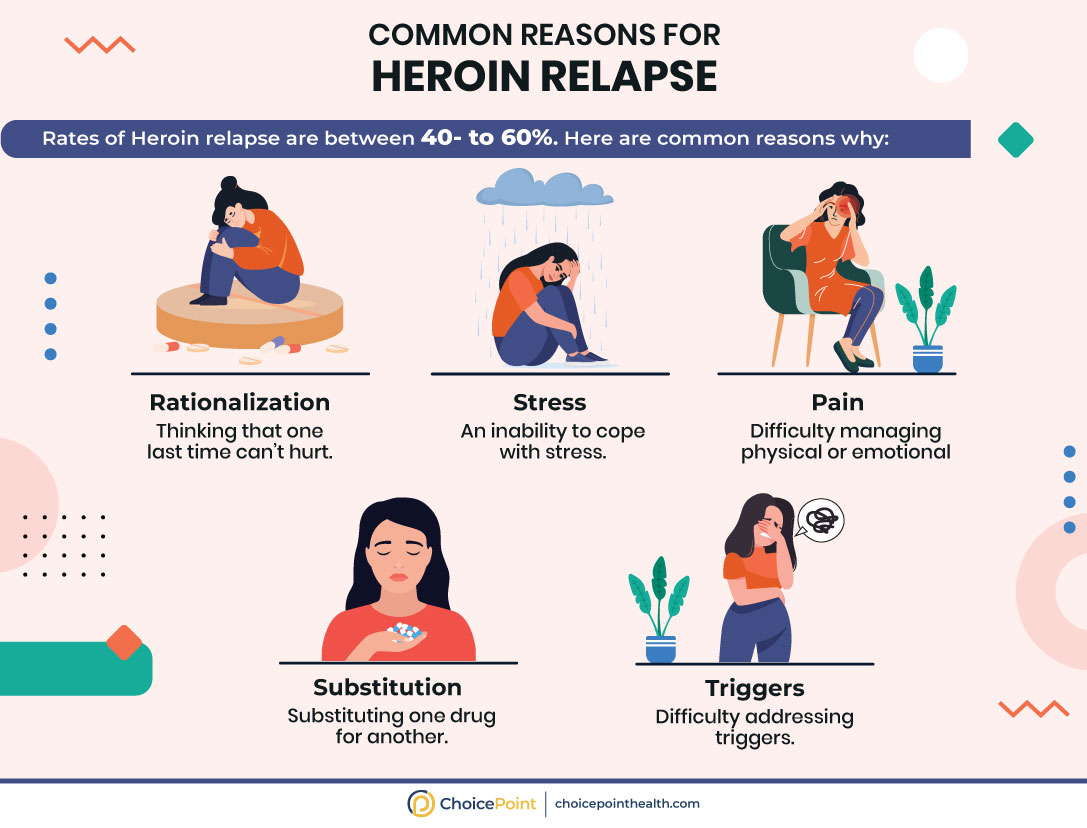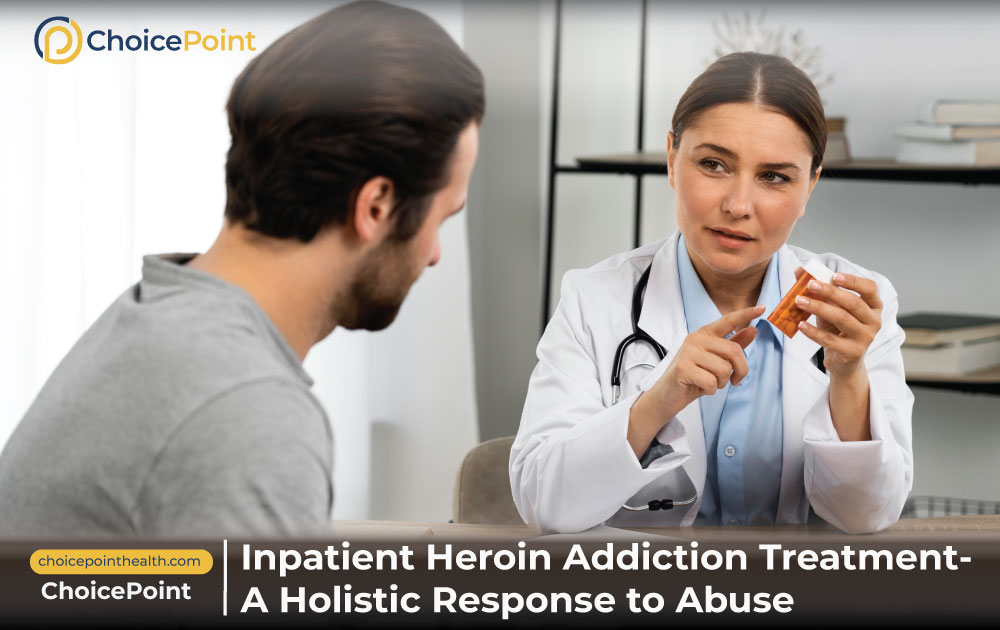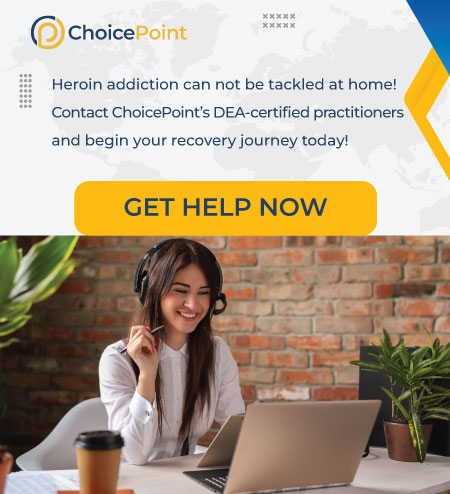Every year, 902,000 Americans use heroin, resulting in 14,000 overdose deaths. 6.25 million have used heroin at some point in their lives. Heroin addiction is a widespread and difficult problem that necessitates a comprehensive and tailored approach. Inpatient heroin addiction treatment is a comprehensive approach to drug usage. Let’s take a look at how it can aid people who are addicted to heroin.
ChoicePoint offers in-person and virtual consultations to anyone looking for help! Call us now at 844.445.2563, or fill out this form.
Table of Contents
Heroin Abuse- At a Glance
The heroin epidemic in the US has reached a point where this crisis is in alarming proportions. It is affecting people from all areas of life. Heroin abuse, known for its potency and addictive characteristics, can swiftly spiral into dependency. It may also result in significant health implications and socioeconomic issues. In response to the crisis, inpatient heroin addiction treatment has gained popularity for its ability to provide comprehensive, round-the-clock care for patients suffering from addiction. Here are some statistics that will help you to highlight the critical nature and urgency of this issue:
Heroin Use in 2021
Among individuals aged 12 or older in 2021, 0.4% (approximately 1.1 million people) reported using heroin in the past 12 months.
Heroin Use Among Young Students in 2022
In 2022, an estimated 0.3% of 8th graders, 0.2% of 10th graders, and 0.3% of 12th graders reported using heroin in the past 12 months.
Overdose Deaths Involving Heroin in 2021
In 2021, approximately 9,173 people died from overdoses involving heroin.

Were you aware that overdoses involving drugs killed over 106,000 people in the United States in 2021? That equates to nearly 292 people per day.

Were you aware that overdoses involving drugs killed over 106,000 people in the United States in 2021? That equates to nearly 292 people per day.
Healing from Within: Strategies for Heroin Addiction Treatment
Heroin is the deadliest Opioid. At ChoicePoint, our DEA-certified practitioners provide expert Inpatient heroin addiction treatment. Don’t you just wish to open a new chapter of your with the right treatment, free from the grip of addiction? Inpatient Heroin addiction treatment will not only address addiction but also eliminate it! To do that, patients undergo some of the treatments detailed below:
Comprehensive Assessment and Tailored Treatment Plans
Upon admission the thorough examination performed upon admission is one of the primary benefits of inpatient addiction treatment.
- Healthcare professionals conduct a thorough evaluation.
- They take into account the physical, psychological, and social elements of the individual’s addiction.
- The purpose of the examination is to assist in the formulation of a personalized treatment plan.
- Each Heroin Addiction Treatment plan is customized to each patient’s specific needs and challenges.
Heroin Detox
Medical Heroin detoxification is a critical part of inpatient heroin addiction treatment. It aims to manage the withdrawal symptoms associated with heroin abstinence safely.
- A heroin detox is 10-14 days long.
- Withdrawal from heroin can be painful and, in some situations, dangerous to one’s health.
- Inpatient facilities are geared to provide medical supervision and assistance, making detoxification safer and more comfortable.
- During this period, doctors may closely monitor the physical and mental health of the patient.

“Were you aware that Heroin’s ability to quickly enter the brain results in a fast and intense high? The chances of developing an addiction are high, and addicts may continue to abuse despite negative consequences.”

“Were you aware that Heroin’s ability to quickly enter the brain results in a fast and intense high? The chances of developing an addiction are high, and addicts may continue to abuse despite negative consequences.”
Inpatient Treatment for Heroin Addiction
Inpatient (residential treatment) is the most important type of treatment for people struggling with heroin addiction.
- Inpatient Heroin Addiction Treatment is a closely regulated, live-in program.
- It usually lasts 30 to 90 days but can be prolonged based on the patient’s needs.
- Inpatient treatment includes a variety of programs and therapies aimed at assisting the individual in overcoming their addiction.
Medication Assisted Treatment (MAT)
MAT increases the likelihood of patients remaining in treatment programs and decreases drug use, infectious disease transmission, and criminal activity. Opioid addiction medications target the same brain receptors as the addictive drug. However, they are safer and reduce the dangerous behaviors associated with substance use disorders. Common FDA-approved medications offered during Inpatient Heroin Addiction Treatment include:
Holistic Therapies for Comprehensive Healing
Heroin addiction is more than just a physical condition; it is the result of a complex interplay of physical, emotional, and social variables. To manage this, inpatient Heroin addiction treatment rehabs use a variety of holistic therapies. Therapies may include:
- individual counseling
- group therapy
- art and music therapy
- mindfulness practices
- CBT
- DBT
The holistic approach acknowledges that true healing extends beyond symptom treatment, delving into the causes of addiction and giving tools for long-term recovery.
Structured Environment and 24/7 Support
Inpatient treatment provides a controlled and supportive setting essential for people in the early stages of recovery. The availability of medical and mental health professionals 24/7 ensures that patients receive quick assistance in times of crisis. This continuous support is vital, especially during the sensitive early stages of recovery.
Skill-Building for Long-Term Sobriety
Inpatient heroin addiction treatment emphasizes skill development as an essential part of the recovery process.
- Patients participate in therapeutic activities that teach them coping skills, stress management techniques, and relapse prevention approaches.
- Learning these skills in the haven of an inpatient facility boosts their effectiveness and promotes a sense of empowerment.
- Doctors help patients establish a solid basis for long-term recovery.

Most Common Reasons For Addiction Relapse
Addressing Co-Occurring Disorders
Heroin addiction frequently coexists with other mental health issues. It may result in a complex web that necessitates specialized care.
- Inpatient treatment facilities can treat these co-occurring disorders simultaneously.
- The Dual Diagnosis treatment enables a holistic and integrated approach to mental health.
- Inpatient programs increase the likelihood of long-term recovery by addressing the individual as a whole rather than just the addiction.
Transition and Aftercare Planning
The road to rehabilitation does not end after an inpatient program is completed. Recognizing the importance of ongoing assistance, inpatient facilities conduct extensive transition and aftercare planning. This includes connecting patients with outpatient services, support groups, and continued therapy to provide a smooth transition back into daily life while adhering to the concepts gained during inpatient treatment.
Inpatient Heroin Addiction Treatment at ChoicePoint begins with medical detoxification. It is a crucial phase aimed at managing the withdrawal symptoms associated with heroin cessation. To get in touch with our doctors, call 844.445.2563 today!
Levels of Care At ChoicePoint- Get In Touch Today!
Remember, addiction is treatable, and recovery is possible with professional help at an Inpatient Heroin Addiction Treatment center. At ChoicePoint, we combine medication and psychotherapy to offer a holistic response to abuse. Get help from a specialized center staffed by qualified addiction specialists, emphasizing the understanding of addiction as a chronic brain disease. Our doctors accept most insurance plans. Make sure to verify!
Our levels of care include:
- Medical Detoxification
- Inpatient Rehabilitation
- Partial Hospitalization Program (PHP) / HIOP in NJ
- Intensive Outpatient Program (IOP)
- Outpatient Treatment
- Aftercare and Continuing Support
- Medication Assisted Program (MAT)

Here is a fact you did not know: … In 2020, approximately 40 million people aged 12 and up required treatment for a substance abuse disorder; however, only about 4 million sought and received treatment.

Here is a fact you did not know: … In 2020, approximately 40 million people aged 12 and up required treatment for a substance abuse disorder; however, only about 4 million sought and received treatment.
Q&A Section Regarding Inpatient Heroin Addiction Treatment
Take a look at the most asked questions about Inpatient Heroin Addiction Treatment.
How Long Does it Take to Get Physically Addicted to Heroin?
Developing a heroin addiction can vary. However, it often occurs within a few weeks of regular use.
Can I Take Suboxone After I Use Heroin?
Attempting to use heroin shortly after taking Suboxone can be risky and may lead to reduced effects due to the opioid receptor blockade. However, it’s crucial to emphasize that such actions pose serious health risks, and seeking professional advice is strongly recommended.
How Can You Stop Someone from Using Heroin?
It is important to help a close one struggling with heroin addiction. Encouraging professional intervention, support, and therapy can be effective in helping someone abstain from using heroin.
How Long Do Heroin Withdrawal Symptoms Last?
Heroin withdrawal symptoms may last 8 to 24 hours after the last use of the drug. The time duration may vary from person to person. Medical intervention is advised.
What Are Common Signs of Heroin Addiction?
Common Heroin addiction signs include:
- Slurred speech,
- Memory problems,
- Reduced sense of pain,
- Problems at school or work,
- Risky behavior,
- Constricted (smaller) pupils.
Medical Disclaimer:
ChoicePoint aims to improve the quality of life for people struggling with substance use disorder and mental health issues. Our team of licensed medical professionals research, edit and review the content before publishing. However, this information is not intended to be a substitute for professional medical advice, diagnosis, or treatment. For medical advice please consult your physicians or ChoicePoint's qualified staff.











Review Inpatient Heroin Addiction Treatment- A Holistic Response to Abuse.